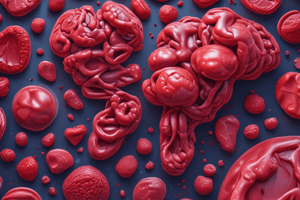Podcast
Questions and Answers
What are the stages of iron depletion?
What are the stages of iron depletion?
- Iron deficiency anemia, iron depletion without physiological affects, iron deficiency without anemia
- Iron depletion without physiological affects, iron deficiency without anemia, Iron deficiency anemia (correct)
- Iron deficiency without anemia, iron deficiency anemia, iron depletion without physiological affects
- Iron depletion without physiological affects, iron deficiency anemia, Iron deficiency without anemia
Which of the following is NOT a consequence of iron deficiency anemia?
Which of the following is NOT a consequence of iron deficiency anemia?
- Decreased hemoglobin levels
- Decreased red blood cell volume
- Decreased serum ferritin
- Increased oxygen extraction (correct)
What is the primary characteristic that differentiates macrocytic anemia from microcytic anemia?
What is the primary characteristic that differentiates macrocytic anemia from microcytic anemia?
- The size of the red blood cells (correct)
- The number of red blood cells
- The color of the red blood cells
- The shape of the red blood cells
What is the relationship between hematocrit and hemoglobin?
What is the relationship between hematocrit and hemoglobin?
What is the estimated percentage of the world's population that is anemic?
What is the estimated percentage of the world's population that is anemic?
Which of the following is NOT true about haemoglobin?
Which of the following is NOT true about haemoglobin?
Which of the following is a primary storage form of iron in the human body?
Which of the following is a primary storage form of iron in the human body?
What is the cut-off value for haemoglobin in a 10-year-old child considered anaemic?
What is the cut-off value for haemoglobin in a 10-year-old child considered anaemic?
What is the role of heme in the haemoglobin molecule?
What is the role of heme in the haemoglobin molecule?
Which of the following statements is TRUE regarding ferritin levels?
Which of the following statements is TRUE regarding ferritin levels?
What is the main difference between ferritin and hemosiderin?
What is the main difference between ferritin and hemosiderin?
Which of the following is NOT a factor that could affect iron status?
Which of the following is NOT a factor that could affect iron status?
What is the primary function of haemoglobin (Hb) in the body?
What is the primary function of haemoglobin (Hb) in the body?
According to the provided content, what is a common consequence of anemia?
According to the provided content, what is a common consequence of anemia?
What is the medical definition of anemia?
What is the medical definition of anemia?
Which of the following is NOT a category at risk of iron deficiency, as mentioned in the content?
Which of the following is NOT a category at risk of iron deficiency, as mentioned in the content?
According to the provided content, what is the main characteristic of anemia?
According to the provided content, what is the main characteristic of anemia?
Flashcards
Anemia
Anemia
A condition with lower than normal red blood cells or hemoglobin.
Hemoglobin (Hb)
Hemoglobin (Hb)
A protein that transports oxygen and carbon dioxide in the blood.
Iron deficiency
Iron deficiency
A lack of iron, leading to reduced hemoglobin production and anemia.
Indicators of Iron status
Indicators of Iron status
Signup and view all the flashcards
Categories at risk of iron deficiency
Categories at risk of iron deficiency
Signup and view all the flashcards
Hematocrit
Hematocrit
Signup and view all the flashcards
Iron Deficiency Stages
Iron Deficiency Stages
Signup and view all the flashcards
Types of Anemia
Types of Anemia
Signup and view all the flashcards
Iron Deficiency Anemia
Iron Deficiency Anemia
Signup and view all the flashcards
Consequences of Iron Deficiency Anemia
Consequences of Iron Deficiency Anemia
Signup and view all the flashcards
Haemoglobin structure
Haemoglobin structure
Signup and view all the flashcards
Heme group function
Heme group function
Signup and view all the flashcards
Iron center in heme
Iron center in heme
Signup and view all the flashcards
Oxygen-carrying capacity
Oxygen-carrying capacity
Signup and view all the flashcards
Iron storage forms
Iron storage forms
Signup and view all the flashcards
Ferritin significance
Ferritin significance
Signup and view all the flashcards
Indicators of iron deficiency
Indicators of iron deficiency
Signup and view all the flashcards
Anemia assessment values
Anemia assessment values
Signup and view all the flashcards
Study Notes
Anemia Overview
- Anemia is a condition where the number of red blood cells (RBCs) or the haemoglobin concentration within RBCs is lower than normal.
- It's a widespread public health problem, associated with increased morbidity and mortality, especially in pregnant women and young children.
- Hemoglobin (Hb) is a protein that binds oxygen in the lungs and transports it to body tissues. It also binds CO2 from tissues and sends it back to the lungs for exhalation.
- Each hemoglobin molecule contains four polypeptide chains (globin) and four heme groups, each with an iron atom (ferrous, Fe+2) that can bind an oxygen atom.
- Hemoglobin is used as an index of the blood's oxygen-carrying capacity.
- Isolated measurements of hemoglobin concentration or hematocrit levels are not sufficient indicators of iron status, alone.
Iron Storage
- Iron is essential for the body and stored as ferritin and hemosiderin in the liver, spleen, bone marrow, duodenum, and skeletal muscle among other areas.
- Ferritin is the main storage form of iron within the body.
- Hemosiderin and ferritin are iron-containing proteins.
Assessing Anemia
- Measuring hemoglobin levels is essential for anemia assessment.
- Different categories of people have differing cut-off values for hemoglobin levels when assessing for anemia.
Indicators of Iron Status
- Hemoglobin isn't directly impacted in the early stages of anemia development.
- Ferritin is a sensitive indicator of iron status; serum levels correlate with iron stores and in the early stages of iron deficiency they decrease, making it a good measurement of iron stores.
- Ferritin levels can be affected by infection and inflammation. Very low ferritin levels indicate iron deficiency.
- Soluble transferrin receptor (sTfR) levels increase in iron deficiency.
- Hematocrit measures the percentage of red blood cells in the total blood volume, correlating with hemoglobin and depending on red blood cell volume.
Iron Deficiency
- Iron depletion can occur in three stages.
- The first stage involves depleted iron stores without physiological effects, but with decreased serum ferritin levels.
- The second stage is iron deficiency without anemia, involving early or mild iron deficiency with adverse physiological effects.
- The third stage involves iron-deficiency anemia, characterized by decreased serum ferritin (along with other blood indicators).
Types of Anemia
- Anemia is categorized as macrocytic or microcytic based on red blood cell volume.
- Microcytic anemia involves smaller red blood cells.
- Macrocytic anemia involves larger red blood cells.
Iron Deficiency Anemia
- Iron deficiency is a widespread nutritional deficiency.
- Over 30% of the global population experiences it.
- About a billion people suffer from iron deficiency anemia.
- In many developing countries, one in two pregnant women and more than one in three preschool children are anemic.
- Several hundred thousand deaths are globally attributable to iron deficiency anemia.
Consequences of Iron Deficiency Anemia
- Mild iron deficiency anemia may have few consequences as the body may have compensation mechanisms for oxygen extraction.
- Moderate to severe iron deficiency anemia is associated with increased maternal and child mortality, infectious diseases, heart failure and poor wound healing.
- During pregnancy, it can lead to preterm birth and low birth weight, contributing to infant deaths.
- Iron deficiency decreases muscle performance.
Categories at Risk of Iron Deficiency
- Infants and young children experience detrimental cognitive, motor, and social development if iron deficient during rapid growth.
- Breast milk is low in iron after six months.
- Iron needs increase in early childhood.
- Early introduction of cow's milk to infants may hinder iron absorption.
- School-aged children may exhibit lower performance and poor learning abilities due to iron deficiency.
- Pregnant women and women of childbearing age are at risk due to increased iron needs and potential blood loss during pregnancy and menstruation.
Micronutrients and Anemia
- Several micronutrients are involved in blood cell production: B9, B12, Copper, Zinc, and Vitamin A.
Copper
- Copper is an essential nutrient for protein function and oxidation reduction in the human body.
- Copper deficiency can contribute to iron deficiency anemia as copper is important for moving iron.
- Foods rich in copper include legumes, potatoes, nuts, seeds, and beef.
Zinc
- Zinc is an essential trace element for enzyme function, protein production, cell membranes, nucleic acids, growth, and immune function.
- Zinc deficiency can impact red blood cell growth and is associated with anemia.
- Zinc may hinder the absorption of iron and copper,
- Foods rich in zinc include beef, ground beef, legumes, poultry, and ready-to-eat cereals.
B-Vitamins
- A reduction in the body's DNA synthesis ability is expressed as macrocytic megaloblastic anemia.
- Folate and vitamin B12 deficiencies cause megaloblastic anemia.
- Vitamin B12 absorption may be impaired by lack of intestinal intrinsic factor, leading to pernicious anemia.
- Folate is found in dark green, leafy vegetables, fruits, nuts, liver, and yeast.
- Meat, fish, and chicken are sources of vitamin B12.
- Riboflavin (vitamin B2) is abundant in milk products, meat, fish, vegetables, and fruit. Prolonged Riboflavin deficiency can contribute to normocytic normochromic anemia.
- Vitamin B6 (pyridoxyl) can contribute to anemia.
Vitamin A
- Vitamin A deficiency can increase the risk of iron-deficient erythropoiesis and anemia.
- Vitamin A alters the absorption, storage, release, and transport of iron within the body.
- Liver, cod liver oil, milk, cheese, and fortified foods are sources of vitamin A.
- Provitamin A carotenoids (like beta-carotene) are found in soft yellow fruits, orange/yellow tubers, and dark green leafy vegetables.
Dietary Iron
- Dietary iron comes in two forms: heme and non-heme.
- Heme iron is more easily absorbed and found in animal products (meat, poultry, fish).
- Non-heme iron is found in plant sources and is less easily absorbed.
- Absorption of non-heme iron can be enhanced or reduced based on external factors.
Dietary Treatment of Iron Deficiency Anemia
- Iron is required for replacing basal losses, menstruation, and growth.
- Iron requirements differ based on age, physiological status, growth rate, and maturity.
- Heme iron is found in meat, poultry, and fish; non-heme iron is in plant-based foods (cereals, pulses, legumes, grains, nuts, and vegetables).
Iron Absorption
- Substances like ascorbic and citric acids (found in fruits, potatoes, and some vegetables) help maintain iron in the absorbable ferrous form.
- Cysteine-containing peptides (found in meat) aid in iron absorption.
- Other substances like phytates, polyphenols, calcium, and phosphates can hinder iron absorption (found in unrefined cereals, beans, peas, tea, coffee, milk, cheese, and spinach).
Studying That Suits You
Use AI to generate personalized quizzes and flashcards to suit your learning preferences.




